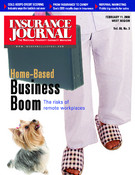The risks for professional liability gain momentum from this new communications medium
The new medium of blogging is changing the way communication is done today with respect to both individuals and the corporate universe, according to Leib Dodell, president and CEO of Media/Professional Insurance.
While blogs pose growing opportunities, they also present risks that need to be managed.
“It is a significant mistake for anyone in business, the law or insurance to dismiss this phenomenon as the latest killer ad that will be gone in a couple of months,” Dodell said, as moderator of a panel for a Professional Liability Underwriting Society seminar held last year. The session was titled “Agog About Blogs” and focused on the legal implications of blogs and how they are changing the professional liability insurance landscape.
Statistics show that there are just under 60 million active blogs, and nearly two new blogs are created every second, Dodell noted. The blogosphere doubles every six months and is 60 times larger today than it was three years ago.
“This is an explosion of new creative activity that is giving rise to risk that needs to be managed and handled in our professional liability insurance community,” Dodell said.
Jonathan Yeisley, vice president, AXIS Professional Lines, noted that there are four general classifications of blogs: personal, political, cultural and corporate.
Yeisley outlined a number of common characteristics shared by blogs. “Blogs are publishers and communication mechanisms, and they all have a need for insurance, sound risk management and education,” he said.
“Another common feature of blogs is that the ease of the technology allows the users, whether corporations or individuals, to have a false sense of security that they can say things that won’t be subject to litigation.” However, Yeisley noted that every blog is subject to digital laws, libel laws and IP laws.
Robert Cox, president, Media Bloggers Association, noted that the significant majority of bloggers are very conscious of the growing liability risks. “However, bloggers think of themselves as writers, not as publishers and therein lies the dilemma,” Cox said.
Employer Risks
Turning to the legal and operational risks arising from blogs, David Mendelsohn, chair of Insurance and Reinsurance Transaction Practice and co-chair of Financia, DLA Piper said that employers need to face the fact that blogging is here to stay.
“How do you deal with this as an employer? You manage the risk,” Mendelsohn said.
He predicted there would be a lot of litigation with respect to blogs in the coming years, but that the risks are manageable. “You do it through disclaimers, you do it through postings, policies and best practices,” he commented.
On whether employers could be held liable for the blogging activities of their employees, Mendesohn said that employers could have liability in certain circumstances.
“Standard principles of laws indicate that an employer can have liability for the actions of an employee within the scope of their employment even if those actions are not authorized,” he said.
Looking ahead, Mendelsohn said that more litigation could be expected in clarifying some of the legal standards that apply to the act of blogging, particularly in the areas of defamation, privacy and copyright infringement.
“Is the law going to change? No. Is it going to evolve? Yes. The law always adapts and moves with developments in society. We will see some developments in the law of defamation and libel. That is inevitable,” he said.
The experts agree there is a common need for increased review and establishment of standards in the blogosphere going forward.
According to Cox, the Media Bloggers Association has drafted a set of standards for its membership that any bloggers are free to adopt. The MBA screens bloggers through its application, education and training, he said.
However, Cox noted that introducing standards for all bloggers is a balancing act. “There is an ethos in the blogosphere that it should be wide open, but it only appears to be the Wild West.
“You can be sued for what you put on your blog. It doesn’t even have to happen because you are wrong. You are publishing, so you are exposed,” he said.
Chad Milton, senior vice president/national practice leader, Marsh Inc., urged all corporations to implement a monitoring system to at least review the blogs and comments posted by employees.
Milton noted that while media companies are used to dealing with third-party content, other organizations are less well-prepared. “Get a policy in place. The insurance industry will follow. We don’t yet have every solution for every size but we are here to support blogging,” Milton said.
This article originally appeared in the January 2007 issue of the PLUS Journal, the monthly publication of the Professional Liability Underwriting Society. It has been reprinted with the permission of PLUS.
Topics Training Development
Was this article valuable?
Here are more articles you may enjoy.


 Insurance Broker Stocks Sink as AI App Sparks Disruption Fears
Insurance Broker Stocks Sink as AI App Sparks Disruption Fears  ‘Structural Shift’ Occurring in California Surplus Lines
‘Structural Shift’ Occurring in California Surplus Lines  Florida Insurance Costs 14.5% Lower Than Without Reforms, Report Finds
Florida Insurance Costs 14.5% Lower Than Without Reforms, Report Finds  A 10-Year Wait for Autonomous Vehicles to Impact Insurers, Says Fitch
A 10-Year Wait for Autonomous Vehicles to Impact Insurers, Says Fitch 


